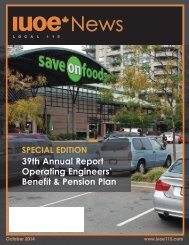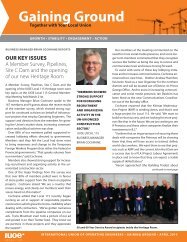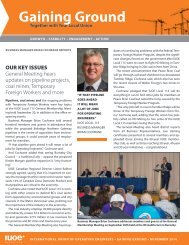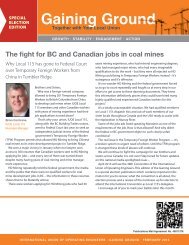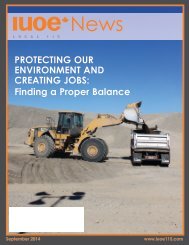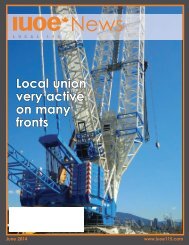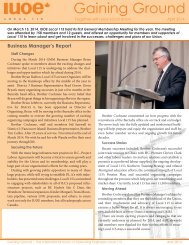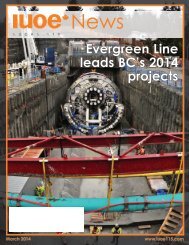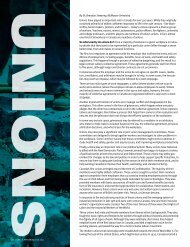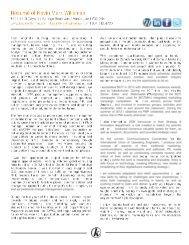IUOE News Winter 2013
The December 2013 issue of the OE News from IUOE Local 115 contains updates for all equipment operators and union supporters in BC. Enjoy!
The December 2013 issue of the OE News from IUOE Local 115 contains updates for all equipment operators and union supporters in BC. Enjoy!
Create successful ePaper yourself
Turn your PDF publications into a flip-book with our unique Google optimized e-Paper software.
Feature Article<br />
Right to Work<br />
Doing nothing to improve worker rights<br />
Could we see the controversial U.S.-style “right to work’<br />
laws come to Canada?<br />
White Rock M.P. Russ Hiebert’s Bill C-377 isn’t the only<br />
anti-worker legislation facing Canadian labour. There are<br />
strong indications that Conservatives want to bring U.S.-style<br />
‘right to work’ laws into Canada in the near future.<br />
Of course, the name is misleading. There’s nothing in these<br />
U.S. laws which guarantees or makes effort to improve or<br />
grow opportunities to work… only the right to avoid paying<br />
union dues for the services the organizations provide.<br />
Both Ottawa area Conservative Minister Pierre Poilivere<br />
and Ontario’s provincial Conservative Leader Tim Hudak<br />
have recently expressed support for legislation to do away<br />
with mandatory dues check-off in Canada. They want to scrap<br />
the ‘Rand Formula’ which has been so important to trade<br />
union development in Canada.<br />
The ‘Rand Formula’ is an agreement between employers<br />
and unions that was put in place in Canada<br />
shortly after the 2nd World War. Following<br />
a bitter and lengthy auto industry strike in<br />
Windsor Ontario in 1946, Supreme Court<br />
of Canada Justice Ivan Rand established<br />
mandatory dues check-off as part of an<br />
arbitrated settlement. The ‘Formula’ was subsequently<br />
adopted in all provinces, and has been a valuable cornerstone<br />
of Canadian labour law ever since.<br />
The Rand decision basically says that all members of a<br />
trade union should pay dues in exchange for the services it<br />
recognizes that members receive from their trade union.<br />
Rand rightly argued that collective bargaining, grievance<br />
handling, benefits administration, pension administration,<br />
and training benefits all members of a union, added to higher<br />
wages and benefits. Rand therefore concluded that it’s only<br />
fair and reasonable for all union members to pay for these<br />
services which all members benefit from. His decision ultimately<br />
directed that employers must deduct union dues from<br />
each pay cheque and remit those funds to the union to keep<br />
the agreements in place and the union functions viable.<br />
Imagine what trade unions and unionized workplaces<br />
would be like if this well-established mandatory dues check<br />
“What they’re really talking<br />
about is giving you the right<br />
to work for less money”<br />
Michigan’s recent approval of ‘Right to Work’ legislation created<br />
awareness and opposition among labour unions and workers, which<br />
they say will be felt by state leaders during the next voting polls.<br />
off formula was eliminated.<br />
All union members would continue to benefit from the<br />
collective agreement—but individual members would be free<br />
to decide whether or not they pay dues. Obviously some<br />
members would decide not to pay (discreetly or openly, with<br />
or without any valid reason).<br />
That in turn would create “free riders”<br />
who would continue to benefit personally<br />
from the union contract without having<br />
to pay for it, while unions would still have<br />
an expensive obligation to represent and<br />
provide for all members, paid-up or not. Imagine the tension,<br />
conflict, and financial stress this would create in unions and<br />
workplaces. Members still paying dues would greatly resent<br />
those choosing not to, or simply join them.<br />
Eliminating the Rand Formula is a deliberate recipe for<br />
conflict in the workplace, disputes amongst employees, and<br />
severe weakening or failure of their unions.<br />
24 U.S. states have passed ‘Right to Work’ legislation despite<br />
union boycotting and evidence proving its negative affects on<br />
the working class. Even President Obama’s slamming of the<br />
legislation has not deterred the union busters.<br />
Canadian unionists need to stand together to ensure this<br />
doesn’t get any traction. Members need to stay informed of its<br />
growth and impact on our U.S. brothers and sisters, as well as<br />
our own government’s attention and opinion on the issue.<br />
The survival of the Canadian labour movement may<br />
depend on it.<br />
U.S. Pres. Barack Obama<br />
“We must guard against being fooled by false slogans, such as ‘right to work.’ It is a law that robs us of our civil<br />
rights and job rights. Its purpose is to destroy labor unions and the freedom of collective bargaining by which<br />
unions have improved wages and working conditions of everyone. Wherever these laws have been passed,<br />
wages are lower, job opportunities are fewer and there are no civil rights.”<br />
Martin Luther King, 1961<br />
<strong>News</strong> December <strong>2013</strong> 15




